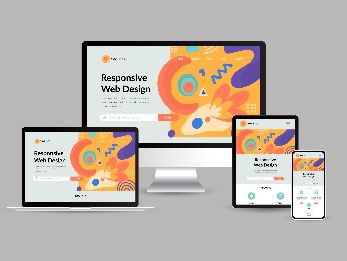The Future Of Responsive Web Design: Emerging Trends, Innovations And Predictions In 2024
7 mins | 26 Apr 2024

Responsive web design has played a vital role in web development for the past decade, making sure that websites adapt to numerous devices and screen sizes for optimal user experience. As technology evolves, the anticipated trends, as well as predictions for responsive web design, suggest a significant transformation in how websites are constructed and engage with the audience.
As technology continues to progress at a rapid pace, the outlook for responsive website design appears highly encouraging! With the increasing usage of mobile devices and the constantly evolving array of screen dimensions, it is becoming essential for websites to adjust and deliver a smooth user experience across all platforms, which is more crucial than before!
Therefore, in today's blog, we are going to discuss the importance of having responsive web design in today's time as well as in the future and a lot more! You’ll have to read the entire article to understand the aspect of responsive web design, so let's begin!
5 Key Factors Pointing Towards The Dominance Of Responsive Web Design In The Future
a) Seamless User Experience — User experience is all about the interaction that takes place between a user and a brand. A study conducted by Google’s Think Insights stated that if an online user visits a website and faces a poor experience & gets frustrated, then there's a 61% chance that they will leave the website immediately and move on to another website!
So, now you understand why responsive web design has garnered all the attention in the online world and its importance! You must know that 88% of online users or customers say that they would not return to a website after having a poor user experience. In addition, it is said that a well-crafted user interface design can result in increasing the conversion rates by 200%!
b) Everyone Is Using Mobile Devices! — It's obvious that mobile devices can be seen in everyone’s hands today, and who is not familiar with using smartphones in today's world? Unfortunately, there are many businesses that have not yet recognised this opportunity and have failed to implement responsive design to their websites! But you must know that nowadays, Google is receiving more than 20% of the searches through mobile devices. About 61% of the individuals form a good opinion about a brand that offers great mobile experiences. So, what more reasons do you want to understand the importance of responsive web design!
c) Responsive Design & SEO Goes Hand In Hand — Just a short time ago, Google revealed its strategy towards prioritising mobile-first indexing, and since then, the world of SEO has undergone significant changes! As responsive web design impacts SEO by encouraging positive user behaviour signals, the announcement strongly advocated for implementing responsive design on an SEO's mobile website.
SEO is important for building your brand, attracting customers and enticing them to keep coming back to you! In order to appear in the top results of the SERPs, you should optimise your website. Search engines such as Google consider responsive web design a ranking factor, which means that if the usability of your website is low, then Google will be upset with you and not rank high on the SERPs!
d) Prefer Mobile-Friendly Websites — It might be disheartening for some of you to realise that even if you have a well-crafted website for your business, people would still like to leave and go to another website that is responsive! The true fact is that people will like to engage actively if your website is mobile-ready. Yes, mobile devices come with small screens, and the website requires flexible grids, fluid layouts & distinct font sizes. You must know that more than 72% of individuals prefer visiting websites that have responsive web design!
e) Website Speed Is The Key — As per the standards set by Google PageSpeed Developers, it is advised that the content visible without scrolling (above the fold) on a mobile device should load within 1 second, and the entire page should load within 2 seconds. However, achieving this might be challenging when it comes to loading a desktop website on a mobile device. When online users experience delays in page loading, they are likely to leave that website.
Trends And Innovations That Are Shaping The Future Of Responsive Web Design
Here are the newest trends and revolutionary innovations that are influencing the evolution of responsive web design! You must stay ahead in the web development landscape and develop user-centric, adaptable & attractive websites!
1. Mobile-First Approach
When it comes to internet users, the majority of them prefer to access websites through mobile devices, and therefore, having a mobile-first approach has now become vitally important! This specific approach includes crafting a mobile version of the website initially and then continuing to enhance it for larger screen sizes. By shifting the focus towards mobile users, web developers must ensure that the important content is easily accessible to the people, no matter what device they utilise! This methodology helps in improving loading times along with user satisfaction, which results in great SEO rankings.
2. Progressive Web Apps (PWAs)
PWAs stands for Progressive Web Apps, and this particular trend is known for building the future of responsive web development! Progressive web apps encompass the strengths of both websites and mobile apps, which helps in a smooth user experience. These types of applications function without any internet connection and can be installed on mobile devices, which eliminates the requirement of installing applications from app stores. PWAs leverage contemporary web tools such as Service Workers to store content, resulting in quicker loading speeds and enhanced efficiency. They present a valuable solution for businesses aiming to captivate users with a dependable, swift, and immersive interface.
3) Integration Of Artificial Intelligence
The future of creating adaptable websites depends on leveraging the capabilities of Artificial Intelligence (AI). AI has the ability to empower websites to adapt seamlessly according to the preferences and actions of the users. For example, chatbots powered by AI are able to deliver customised support, providing internet users with relevant information and assisting them as they navigate further! In addition, AI algorithms also have the ability to analyze user engagements and enhance website layouts in a continuous manner, ensuring a personalised experience in real time.
4. Accelerated Mobile Pages (AMP)
In this world where speed is supreme, Google's Accelerated Mobile Pages (AMP) initiative has garnered considerable attention! AMP, an open-source platform, enables web developers to develop mobile-responsive web pages that have faster loading speed. By streamlining the essential process, AMP eliminates the time needed for a page to display. Consequently, internet users kind of confront minimal delays, potentially decreasing bounce rates and enhancing user engagement levels.
Final Thoughts
Responsive web development is undoubtedly the future of the web development landscape! As users all over the world are increasingly accessing websites via different types of devices, specifically mobile devices, web designers or developers should prioritise offering seamless experiences across numerous platforms.
With the integration of AI in web development, the mobile-first approach, the advancement of PWAs, and the continuous efforts and commitment of web development companies like 12Grids, the future of responsive web development holds a significant amount of value! Embracing all these trends or even upcoming ones in the future will empower more & more businesses to connect to wider audiences, stay competitive, and offer unparalleled user experiences.
Key Takeaways
- Compliance with accessibility standards will be a key priority in responsive web design, which ensures that websites are usable and navigable by all users, including all those with disabilities.
- As users are expecting faster page loading, responsive web design in 2024 will prioritise performance optimisation, which employs techniques such as image optimisation, slow loading, and efficient code practices.
- It is anticipated to see more AI-driven personalisation in responsive web design, where websites adapt their content, layout & functionality on the basis of user behaviour & preferences.
- PWAs will continue to acquire traction, which provides users with app-like experiences directly via their browsers, with features like push notifications, offline functionality and home screen installation.
- Given the growing concerns related to data privacy & security, responsive web design is going to prioritise robust security measures & transparent data handling practices to ensure user trust and compliance with regulations such as GDPR & CCPA.
Author

Share
Share
Related

Polymers, Innovation, And A Modern Website: The Goldstab Organics Journey
5 mins : 10 Nov 2025

From Friction to Finish Line: The God of Sports Digital Transformation
6 mins : 17 Sept 2025

Everything You Should Know About The Ideal Screen Size For Responsive Design
6 mins : 26 Apr 2024



